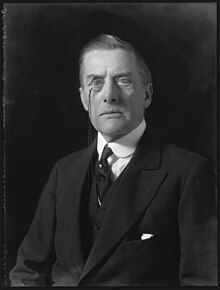Sir Austen Chamberlain | |
|---|---|
 Chamberlain in 1931 | |
| First Lord of the Admiralty | |
| In office 24 August 1931 – 5 November 1931 | |
| Prime Minister | Ramsay MacDonald |
| Preceded by | A. V. Alexander |
| Succeeded by | Sir Bolton Eyres-Monsell |
| Foreign Secretary | |
| In office 3 November 1924 – 4 June 1929 | |
| Prime Minister | Stanley Baldwin |
| Preceded by | Ramsay MacDonald |
| Succeeded by | Arthur Henderson |
| Lord Privy Seal Leader of the House of Commons | |
| In office 1 April 1921 – 23 October 1922 | |
| Prime Minister | David Lloyd George |
| Preceded by | Bonar Law |
| Succeeded by | Robert Cecil |
| Chancellor of the Exchequer | |
| In office 9 October 1903 – 4 December 1905 | |
| Prime Minister | Arthur Balfour |
| Preceded by | Charles Thomson Ritchie |
| Succeeded by | H. H. Asquith |
| In office 10 January 1919 – 1 April 1921 | |
| Prime Minister | David Lloyd George |
| Preceded by | Bonar Law |
| Succeeded by | Sir Robert Horne |
| Secretary of State for India | |
| In office 25 May 1915 – 17 July 1917 | |
| Prime Minister |
|
| Preceded by | Robert Crewe-Milnes, 1st Marquess of Crewe |
| Succeeded by | Edwin Montagu |
| Postmaster General | |
| In office 11 August 1902 – 9 October 1903 | |
| Prime Minister | Arthur Balfour |
| Preceded by | Charles Vane-Tempest-Stewart, 6th Marquess of Londonderry |
| Succeeded by | Lord Stanley |
| Member of Parliament for Birmingham West | |
| In office 14 July 1914 – 16 March 1937 | |
| Preceded by | Joseph Chamberlain |
| Succeeded by | Walter Higgs |
| Member of Parliament for East Worcestershire | |
| In office 30 March 1892 – 7 July 1914 | |
| Preceded by | George Hastings |
| Succeeded by | Leverton Harris |
| Personal details | |
| Born | Joseph Austen Chamberlain 16 October 1863 Birmingham, England |
| Died | 16 March 1937 (aged 73) London, England |
| Political party | Liberal Unionist Conservative[1] |
| Spouse |
Ivy Muriel Dundas (m. 1906) |
| Children | 3 |
| Parent(s) | Joseph Chamberlain Harriet Kenrick |
| Education | Rugby School |
| Alma mater | Trinity College, Cambridge Sciences Po University of Berlin |
| Signature | |
Sir Joseph Austen Chamberlain KG (16 October 1863 – 16 March 1937) was a British statesman, son of Joseph Chamberlain and older half-brother of Prime Minister Neville Chamberlain. He served as a Member of Parliament (MP) for 45 years, as Chancellor of the Exchequer (twice) and was briefly Conservative Party leader before serving as Foreign Secretary.
Brought up to be the political heir of his father, whom he physically resembled, he was elected to Parliament as a Liberal Unionist at a by-election in 1892. He held office in the Unionist coalition governments of 1895–1905, remaining in the Cabinet as Chancellor of the Exchequer (1903–05) after his father resigned in 1903 to campaign for Tariff Reform. After his father's disabling stroke in 1906, Austen became the leading tariff reformer in the House of Commons. Late in 1911 he and Walter Long were due to compete for the leadership of the Conservative Party (in succession to Arthur Balfour), but both withdrew in favour of Bonar Law rather than risk a party split on a close result.
Chamberlain returned to office in H. H. Asquith's wartime coalition government in May 1915, as Secretary of State for India, but resigned to take responsibility for the disastrous Kut Campaign. He again returned to office in David Lloyd George's coalition government, once again serving as Chancellor of the Exchequer. He then served as Conservative Party leader in the Commons (1921–1922), before resigning after the Carlton Club meeting voted to end the Lloyd George Coalition.
Like many leading coalitionists, he did not hold office in the Conservative governments of 1922–1924. By now regarded as an elder statesman, he served an important term as Foreign Secretary in Stanley Baldwin's second government (1924–1929). He negotiated the Locarno Treaties (1925), aimed at preventing war between France and Germany, for which he was awarded the Nobel Peace Prize. Chamberlain last held office as First Lord of the Admiralty in 1931. He was one of the few MPs supporting Winston Churchill's appeals for rearmament against the German threat in the 1930s and remained an active backbench MP until his death in 1937.
- ^ "History of Sir Austen Chamberlain – GOV.UK". Archived from the original on 16 May 2015. Retrieved 3 June 2015.